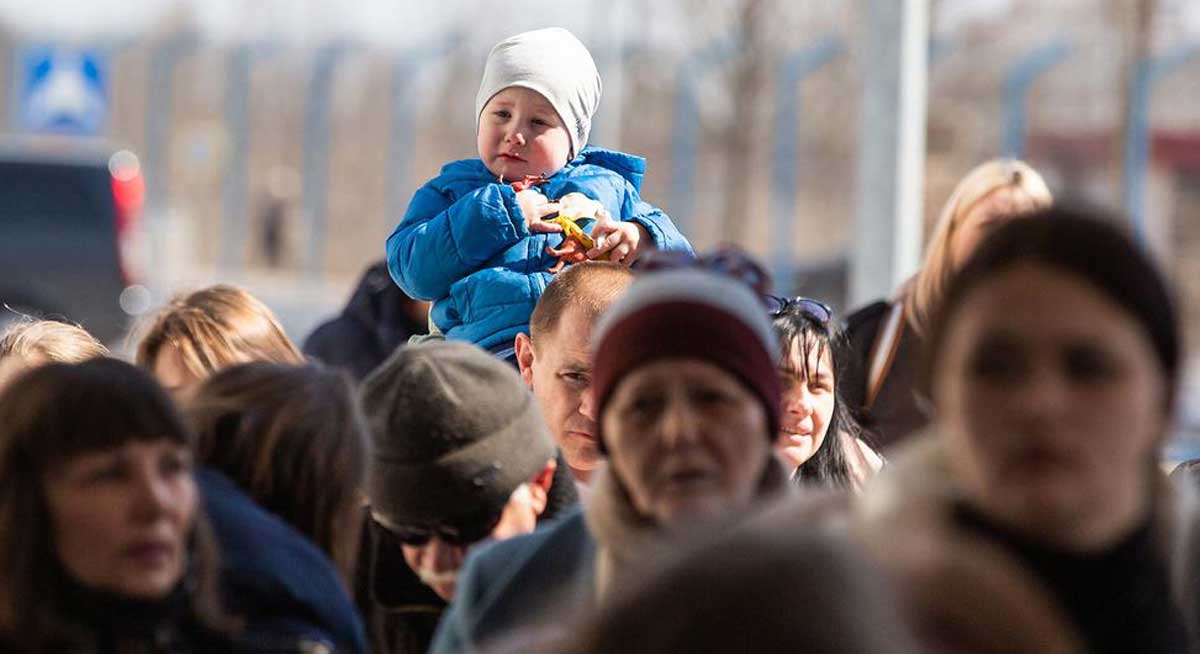When talking about security the most common line of thought tends to be war and the actors involved in the attack, however, all the people who had regular lives within those territories that are jeopardized are as important. With the increasing tensions and armed conflicts happening within the Twenty First Century, the movement of people searching for shelter has increased. More asylum seekers leave their home countries every single day and contemporary politics is still struggling to find a way to catch up. Europe, history wise, is the zone of the world that deals with more refugees wanting to enter the continent due to different factors: geography, proximity, democratic systems, level of development and more. Nevertheless, with the Russia-Ukraine conflict, true sentiments towards refugees are now being put on display.
Even though all refugees are fleeing their countries because their lives are in mortal danger, authorities and government officials do not seem to care. Processes to apply for the refugee status are getting harder and harder. In Europe, to apply for a refugee passport, people are asked for identifications, online questionaries and many other unrealistic aspects that if not answered correctly, the whole process is cancelled. It is ridiculous to believe that when people are scaping in order to stay alive, they will take under consideration all these requirements to receive help, sometimes even from neighboring countries. Which inevitably leads to the following question: why are refugees accepted based on the legality of their applications and not of their status?
By 2016, nearly 5.2 million refugees reached European shores, which caused the so called refugee crisis. They came mainly from Syria, Afghanistan, and Iraq: countries torn apart by armed conflicts. Similarly, with Russia’s invasion over the Ukraine in 2022, only few days deep within the fighting, 874,000 people had to flee their homes. Nonetheless, the issue seems to be that, for Europe, not all refugees are the same. When the refugee crisis in 2015 was declared, the European Union called for stopping and detaining all arriving refugees for around 18 months. There was a strong reluctancy from Europeans towards offering them shelter. On the contrary, countries such as Poland and Slovakia have said that Ukrainian refugees fleeing will be accepted without passports, or any valid travel documents due to the urgency of the situation. Therefore, stating with their actions, that Ukrainian refugees are more valuable or seem to be more worthy of help than refugees from Asia, Africa, or the Middle East.
Correspondingly, it is true that not all countries inside Europe deal and act the same way towards refugees, be that as it may, with the current refugee crisis it has been proved that they all share strong sentiments of xenophobia and racism. For instance, Hungary is a country that refused to admit refugees coming from outside Europe since 2015. In 2018, Prime Minister Viktor Orban described non-European refugees as “Muslim invaders” and “poison” to society, in comparison with Ukrainian refugees who are being welcomed without hesitation. In the same way, Jarosław Kaczyński, who served as Prime Minister of Poland and is the leader of the Law and Justice party, in 2017 said that accepting asylum seekers from Syria would be dangerous and would “completely change our culture and radically lower the level of safety in our country”. Furthermore, Germany in 2015 with Chancellor Angela Merkel in charged said that they would accept one million of Syrians. Although, as time passed, Europe’s solution was to make a deal with Turkey, who is not part of the European Union, to close the migrant route. Moreover, the promise of letting refugees integrate into German society was not fulfilled since. Seven year later, an impressive amount of refugees are still in camps and centers, with their lives frozen in time. Sadly, most European governments gambled towards the idea of sending them back once the armed conflict was over, without caring for the aftermath of war’s destruction.
The common narrative until now pushed by leaders, politicians, and mass media has been that Ukrainians are prosperous, civilized, middle class working people, but refugees coming from the Middle East are terrorists, and refuges from Africa are simply too different. Despite, refugees are all people who share similar emotions and struggle to grasp the fact that their lives may never be the same; having lost their homes, friends, family and so much more. Plus, being selectively welcomed based on their religion, skin color or nationality by the continent which’s complete rhetoric is universal rights, just adds another complex layer to the issue. Conjointly, the displacement of people due to war displays how regular individuals are always the ones who suffer the most in consequence to the interests of the few that represent larger powers. Hence, greed, envy, and cruelty are stronger than recognized, even in a developed continent such as Europe.


